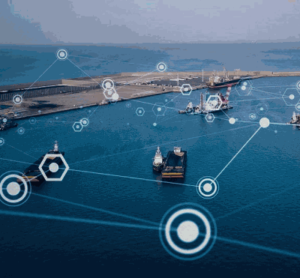The growing dependence on internet connectivity at sea has significantly widened the online attack surface for ships. In the past, vessels had a minimal online presence compared to land-based organizations. Today, with more reliable and readily available internet connections on board, organizations can remotely monitor and troubleshoot vessel operations with much greater ease.
However, this connectivity also brings heightened risks. Ships are now more vulnerable to cyber threats that can compromise critical systems, assets, and the safety of crew members. To counter these threats, it’s vital for vessels to implement secure remote access practices and take strong measures to safeguard against cyberattacks.
The increasing use of remote access communication, also known as maritime remote assistance, has introduced new cybersecurity challenges for ship operations. These vulnerabilities can potentially put the vessel, its cargo, and the crew at risk. To minimize these dangers, adopting secure communication protocols and proactive cybersecurity strategies is crucial. In this blog, we’ll explore practical steps to strengthen remote operations and better protect ships and their crews.
For advanced and secure remote assistance solutions, trust Blessed Marine Automation, the leading marine services provider in the UAE.
What Is Remote Assistance?
Marine remote assistance refers to the use of remotely operated or autonomous systems to carry out tasks or inspections in the marine environment. These systems can be used to perform a wide range of tasks, including maintenance and repair, inspection, surveying, and environmental monitoring. Marine remote assistance is becoming increasingly important as a means of reducing the risk to human workers and improving the efficiency of operations in the marine industry.
Remote access solutions typically have three main parts: a web platform, a physical gateway device, and a software agent installed on the gateway. The platform is the user interface and functional aspect of the solution, the gateway is installed on a ship’s network to access necessary data and onboard systems, and the agent communicates with the platform to enable remote access.

Why Is Remote Assistance Crucial?
Some of the key benefits of Remote access solutions on vessels may offer are:-
- Tracking the movements and telemetry of the vessel through direct access to data
- Periodically copying logs from the ship’s systems to a secure land-based server for incident response purposes
- Conducting initial incident response remotely when a vessel may not reach a port for an extended period of time
- Applying security patches and software updates remotely to improve security and address unique connectivity challenges in the marine and offshore industries
Get the best ship repair services from Blessed Marine Automation
One of the key advantages of maritime remote assistance is that it enables tasks to be carried out safely and efficiently without requiring human presence. This is especially valuable in hazardous or hard-to-reach environments, such as offshore oil and gas platforms or deep-sea drilling sites.
To minimize the risk of unauthorized access to a ship’s systems, it’s critical to carefully assess and address all potential security vulnerabilities. Identifying any weak points that could be exploited by attackers is essential to maintaining the safety, security, and integrity of vessel operations.
Remote access and monitoring technologies are rapidly emerging in the maritime sector, offering promising operational advantages. However, vendors continue to face significant challenges in securing these systems, largely due to the difficulties of maintaining a strong and stable network on a moving vessel with limited connectivity and computing resources. It is vital that both new and existing remote access systems undergo thorough testing to minimize the serious security risks associated with connecting shipboard systems to the internet.
There are a number of challenges associated with the use of maritime remote assistance, however. One challenge is the cost of purchasing and operating these systems, which can be significant. In addition, remotely operated systems can be complex and require specialized training to operate effectively. Finally, there are concerns about the reliability and safety of these systems, particularly in harsh marine environments.
Despite these challenges, the use of marine remote assistance is likely to continue to grow in the coming years. As technology continues to advance and the benefits of these systems become increasingly clear, it is likely that they will be adopted by a wider range of industries and applications. In the future, it is likely that maritime remote assistance will play an increasingly important role in the marine industry, improving safety, efficiency, and environmental sustainability.

